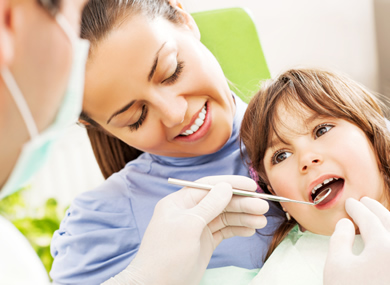Pediatric Dentistry
Overview
Good oral health practices should begin in infancy and continue throughout the adult life. Attitudes and habits established at an early age are critical in maintaining good oral health throughout your child's life. With your help and regular professional care, your child can grow up cavity free and keep their teeth all their lives.
Our dental staff is dedicated to making each kids trip to the dentist office a pleasant, happy experience. When kids have positive associations with visiting the dentist, they are more likely to come in for regular dental cleaning checkups throughout their life and have better overall dental health.
We provide a calm, comfortable, friendly, happy atmosphere at Promenade Family Dentistry for your child. This will ensure a long life positive approach to dental treatments and prevention. For more information or to schedule an appointment, contact us online or call us at (562) 929-1800.
Baby-to-Child Dental Checklist
Some babies are born with neonatal teeth (teeth that develop in the first month) that require dental hygiene or a visit to the dentist for their removal. At least one baby tooth erupts by six months of age. And, yes, it requires cleaning.
From six months to 24 months, children begin teething in earnest, indicated by irritability, biting on objects, drooling and ear pulling. As a parent, you can help teething progress by using strategies such as massaging your child's gums, offering a chilled teething ring or cold, wet washcloth and asking your dentist for a teething ointment recommendation.
By three years of age, most if not all baby teeth have erupted. Soon after four years, spaces for permanent teeth begin to appear as the jaw, supporting bone structure and facial bones begin to grow.
From six to 12, it is typical for your child to have both baby teeth and permanent teeth in their mouth.
Oral Health Care Necessities for Children & Infants
Here's a list of dental care necessities from birth on up:
Baby Teeth Cleaning: Baby teeth should be cleaned as soon as they erupt. Clean your baby's teeth with a soft washcloth or gauze after every bottle or meal. When more than one tooth erupts, you can soak a small-bristled child-sized (age-appropriate) toothbrush in warm water before using it on your baby's teeth, as instructed by your dentist.
Baby teeth should be brushed using a pea-sized amount of toothpaste. Use water without fluoride until approximately six months of age. Encourage your children to brush their own teeth once they have the coordination to do so. Replace toothbrushes every two to three months.
Children's teeth should be brushed after they are given medicine. Acids contained in medicines may eat away at tooth enamel, which serves as a natural protective coating for the teeth.
First Dental Visit: It is important that your child see a dentist by age one to establish a long-term dental hygiene and professional dental cleaning plan.
Dental Sealant Application: Dental sealants are used to protect teeth from decay and are appropriate as soon as a tooth erupts.
Fluoride Treatments: Check with your dentist and water authority about the need for fluoride treatments. Fluoride is a major component in the prevention of childhood dental caries. This is because fluoride alters the molecular structure of the tooth, making it more resistant to acid attack and decay.
However, children require the right balance of fluoride treatment. Too much fluoride could be problematic and lead to fluorosis
.Dental Flossing: Parent-assisted dental flossing should commence when two teeth erupt next to each other. Independent flossing should occur when children have the ability to do it on their own (often by six years of age).
Mouth Washing: Mouth washing is usually recommended by age seven, provided your child can perform the activity.
Orthodontics: Orthodontics may be appropriate by seven years of age.


